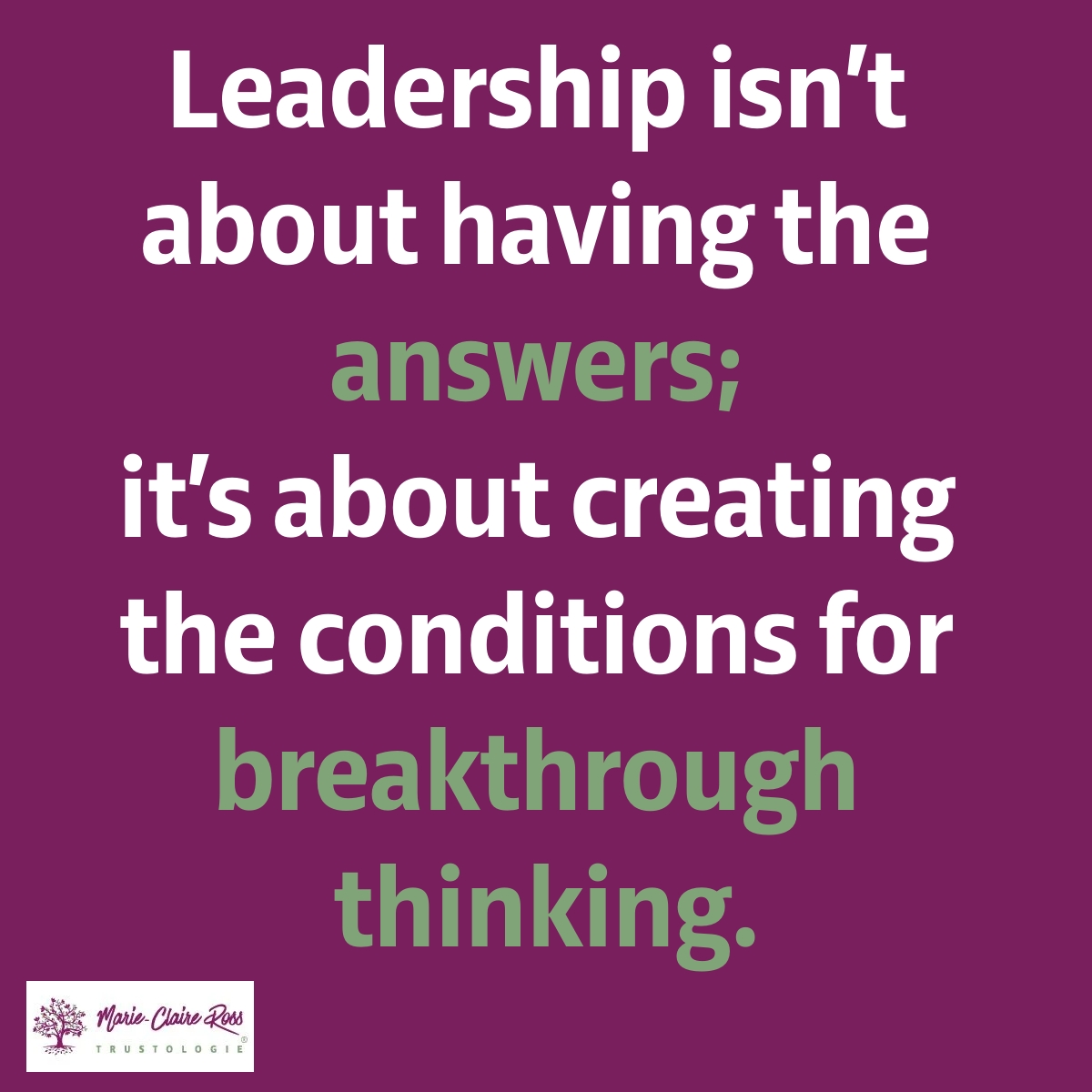8 min read
Beyond the "Why": 5 Coaching Secrets to Unlock Curiosity in Leadership
When my daughter was 17 months old, she discovered a superpower: the word “Why?”For the next two years, it was her response to almost everything.
Develop leaders, strengthen executive teams and gain deep insights with assessments designed to accelerate trust and performance.

Transform how your leaders think and perform with keynotes that spark connection, trust and high-performance cultures.

Explore practical tools, thought-leadership and resources to help you build trusted, high-performing teams.

Trustologie® is a leadership development consultancy founded by Marie-Claire Ross, specialising in helping executives and managers build high-trust, high-performing teams.


Thanks to bad experiences, a cynical society or even the way we were brought up, we tend to search for people’s faults. Without being aware of it, we act like surly teenagers automatically finding the negative in anyone and anything.
In the book, The Power of Bad: How the Negativity Effect Rules Us and How We Can Rule It, authors Roy F. Baumeister and John Tierney, argue that there is a “universal tendency for negative events and emotions to affect us more strongly than positive ones.” We “see the hostile face in the crowd” but “miss all the friendly smiles.”
Our built-in negativity bias stops us from seeing the good in people we work with and focus on the bad. For many of us, we do this subconsciously. Critiquing newcomers with whatever we value - whether it’s their looks, sense of style, how they speak, level of education, intelligence or where they live.
I am embarrassed to admit that I judge people on how they look. Growing up in a family, where physical appearances mattered, I absorbed that belief. Strangely enough, it was my teenager daughter who took me to task. One Saturday morning, watching Rage (a music video show that I’ve watched every week since it started), I made a negative remark about a singer and how they looked. My daughter was annoyed and told me why my comment was inappropriate. She was right (and made me so pleased that Generation Z is better at this than Gen X). I now consciously avoid allowing these quite petty beliefs to impact my initial thoughts on people. And if I say them out loud, the good new is I quickly get correctly with an exasperated “Mother!” (which I have been told is her term for me when I misbehave).
I love being reminded that I am behaving badly. Because I come from a generation that is quick to judge others, just as our parents did before us and their parents and so on. But today, those behaviours are starting to go out of date, just like sugary soft drinks and paying in cash.
But it’s not just our deeply engrained beliefs that impact what we think of others. It’s also past experiences. All of us will encounter people that take advantage of us and treat us disrespectfully. These experiences tend to make us fearful of others and expect the worst. If we let them, they can irrevocably impact our interactions with others.
Low trust leaders tend to have a more negative disposition to the world around them and expect the worst in everyone and everything. They lock up needed supplies, create senseless rules and hold back from sharing important information. Their modus operandi is that “trust must be earned.” They see people as distrustful not realising that they are often inadvertently causing trust issues.
Unfortunately, when we leverage the mighty power of confirmation bias we get what we expect.
Confirmation bias is the tendency to interpret new evidence as confirmation of one's existing beliefs or theories. In business, it means employees see what they want to see and hear what they want to hear to support their beliefs. It can result in business forecasts or plans being unrealistic or projects that aren’t viable being resourced. Leaders ignore market data, customer or employee feedback if it doesn’t match their preexisting beliefs. It’s a cognitive bias that results in poor problem solving, policies and planning. But what it is not commonly talked about is that it also decreases our ability to form strong relationships in the workplace with people who are different to us or who may have changed. If you think people can’t be trusted, they will be most likely act in ways you perceive untrustworthy.
So how do you take advantage of this to help move your team firmly into the achievement zone?
Through swapping over the negative filter from which we unintentionally view the world to a positive, rosy coloured hue. Confirmation bias can be positive if we use it to believe in the good of the people around us.
This requires not jumping to conclusions when something has gone wrong in a project and realising that sometimes things are outside the control of employees.
Think about how you respond to bad news. Do you jump to conclusions, blame others or complain? Or do you calmly ask for more information?
Taking the time to source as much information as you can before making a judgement ensures focusing on a high quality solution. Otherwise, when we resort to finger-pointing, second-guessing or blaming others it can be incredibly damaging to relationships.
The expression "Slow to anger, quick to love" is a good operating model for leadership. Leading with that perspective reduces the risk of bringing chaos and animosity to a situation. It avoids automatically thinking that a person is "lazy", "stupid" or "disorganised.” Even the old technique of counting to five before you reply is remarkably helpful in reducing our automatic negative responses that don't serve anyone.
Managers who operate with positive assumptions, encourage employees to respond in kind. It means that an unpopular or questionable management action is accepted because employees trust that there is more to the story. When everyone leads with thinking the best, it provides comfort during times of rapid change and growth.
One caveat that I would like to point out is that we have to be realistic with our rose-tinted glasses. There are times when people are at fault and if there are complaints about their behaviours then this does need to be investigated. Toxic behaviours can run rampant when we refuse to believe our employees are negligent or behaving poorly and we don’t hold them accountable.
Transitioning to assuming that people are doing their best is a journey. It isn't easy because we have so many biases, habits and beliefs that make it challenging. If you are a high performer who likes to get things done quickly and who tends to make fewer mistakes than others, tolerating little transgressions isn't easy. But it will firmly put you on the path of being an exceptional, high trust leader.
What tricks do you have to stay positive about others?

8 min read
When my daughter was 17 months old, she discovered a superpower: the word “Why?”For the next two years, it was her response to almost everything.

11 min read
I have a friend who often finds herself at the mercy of her emotions. Recently, she called me to rehash a confrontation she’d had with a group of...

9 min read
True leadership presence isn’t a performance or a set of charisma hacks; it is the felt experience of who you are being in the room. By cultivating...

Recently, one of the biggest complaints that I have been hearing about leaders is how a lack of self-awareness is impacting their performance....

One of the things that I strongly believe in, that I mention in my book, Trusted to Thrive, is how leaders make a huge difference in making people...

As organisations get bigger through organic growth or acquisitions, consolidation becomes an important value creation strategy to provide economies...